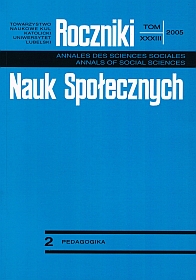Wprowadzenie do pedagogicznej myśli Karola Wojtyły – Jana Pawła II
Abstrakt
The paper focuses on the need to reflect on the methodological foundations of pedagogy and its practical aspect. This problem should be discussed due to the challenges of contemporary life and the so-called critical trends (including anti-pedagogy) that are dominating in pedagogy. According to the author, one can find in the thought of Karol Wojtyła – John Paul II some grounds for such a conception of pedagogy that could face the challenges. The author pinpoints that the personalistic conception of Wojtyła is rooted in experience. It can also be interpreted in terms of classical metaphysics. Accordingly, practice can make use of the rich experience and pedagogical theory is firmly grounded in philosophy. Education here is understood as perfection of one's own humanity with „participation in truth and love” as its essential element. Building this kind of conception should take into consideration some specific elements of Karol Wojtyła's thought. They are as follows: the relation to truth and freedom based on the truth are of fundamental importance; taking into account the practical aspect (a concrete personal pattern), personal understanding of praxis; highlighting the communal aspect (man lives in a community and for a community).
This conception of pedagogy attempts to defend the transcendental and subjective character of truth. Consequently, it is capable of showing the way how to solve the most important problems in pedagogy, such as the crisis of education and authority, setting theory in opposition to practice, excesses of individualism, depersonalisation of social structures and mechanisms.
Bibliografia
Buttiglione R., Myśl Karola Wojtyły, tłum. J. Merecki, Lublin: Towarzystwo Naukowe KUL 1996.
Chudy W., Encyklopedia „Veritatis splendor” a kryzys wychowania, w: Wokół encykliki „Veritatis splendor”, Częstochowa: Wyd. Tygodnik Katolicki „Niedziela”, 1994, s. 145-154.
Kamiński S., Nauka i metoda. Pojęcie nauki i klasyfikacja nauk, Lublin: Towarzystwo Naukowe KUL 1992.
Kamiński S., Naukowa, filozoficzna i teologiczna wizja człowieka, w: Jan Paweł II, „Redemptor hominis”. Tekst i komentarze, red. Z. Zdybicka, Lublin: Redakcja Wydawnictw KUL 1982, s. 75-87.
Kunowski S., Podstawy współczesnej pedagogiki, Warszawa: Wydawnictwo Salezjańskie 2000.
Nowak M., Podstawy pedagogiki otwartej. Ujęcie dynamiczne w inspiracji chrześcijańskiej, Lublin: Redakcja Wydawnictw KUL 2000.
Styczeń T., Być sobą to przekraczać siebie. O antropologii Karola Wojtyły, w: K. Wojtyła, Osoba i czyn oraz inne studia antropologiczne, Lublin: Towarzystwo Naukowe KUL 1994, s. 491-526.
Śliwerski B., Współczesne teorie i nurty wychowania, Kraków: Oficyna Wydawnicza Impuls 2000.
Vloet van der J., Obraz człowieka jako fundament pedagogiki, tłum. L.Balter, „Communio” 12(1992), nr 3, s. 3-11.
Copyright (c) 2005 Roczniki Nauk Społecznych

Utwór dostępny jest na licencji Creative Commons Uznanie autorstwa – Użycie niekomercyjne – Bez utworów zależnych 4.0 Międzynarodowe.


